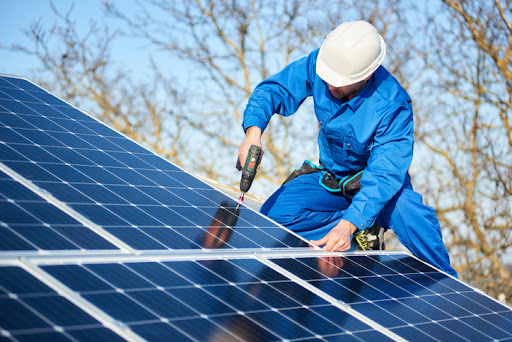
Many homeowners want to install solar panels to lower their utility bills and have a home power source that does not rely solely on the local utility company. While there are many things to consider before installation, the most common question is, “Does installing solar panels affect roof warranty?”
Generally, solar system installation should not void the warranty on your roof if done correctly and according to the roofing manufacturer’s guidelines. Keep your warranty and roof intact, even with modifications like solar panels and skylights, with the following information.
Understanding Solar and Roofing Warranties
Your solar panels and roofing should work in unison to improve your home and quality of life. As such, your panels should not undermine your roof and vice versa. Let’s discuss the different warranties you have for the roof and solar array.
Solar Warranties
Solar panel installations come with the following warranties:
Product Warranty: This covers any potential defects the panels and inverters may have come with when they rolled off of the assembly line. The duration of coverage differs for every manufacturer. For instance, inverters are covered for 10-12 years, while panels will have longer coverage.
Power or Performance Warranty: This ensures the energy production of your panels for the first ten years, with 90 percent of the predicted output. As solar panels age, they deteriorate and provide at least 1% less energy each year.
Workmanship Guarantee: Professional solar installers typically provide a warranty on their work, assuring that it adheres to the highest industry standards and requires no rework or repairs.
Roofing Warranties
Your roof will have separate warranties for the materials and labor:
Standard Warranty: As with solar panels, this covers only production defects by the manufacturer, not installation-related damage or wear and tear. The length of coverage typically varies according to the material type. For example, asphalt shingles feature 20-year warranties, whereas metal roofs have a longer coverage.
Workmanship Warranty: Roofing contractors stand by their work, and these labor warranties guarantee that you won’t have issues with their installation.
What Situations Will Void Roof Warranty?
If you decide to go solar, you may ask yourself, “Does installing solar panels void my roof warranty?”
Well, it depends.
If, after a roofing contractor builds your roof, a solar company installs solar panels and, in the process, adds other roofing elements, the roofing company will not cover the new features. For example, if the solar company drills holes in the roof for panel assembly mounting and adds flashing, the flashing will not be covered by the roofing contractor’s warranty. As a homeowner, you could simplify the process by having the roofer install the flashing for the solar panels. That way, you’ll know that your roofing contractor covers any resulting roof damage.
However, keep in mind that some roofers will void your warranty altogether if any part of the roof was altered by the solar company or a third party. As such, it’s best to discuss these details with your roofer before doing business with them.
Dealing with Voided Roof Warranty
The best way to maintain a roof warranty amidst a solar panel installation is to consult your original roofer. They will advise you or your solar installer on ensuring the roof won’t sustain damage and have its warranty voided.
Should the unfortunate occur and you’re left with an invalidated roof warranty, your solar installer should cover the damage. Most workmanship guarantees ensure there will be no issues with their work quality. Rest assured that you’re covered, even if you know there’s a favorable answer to whether solar panels void roof warranties or not.
But what happens when you need a new roof with solar panels?Work with a trusted contractor in the Los Angeles area like Roof Repair Specialist to replace your roof. Also, you will need to contact your solar installer and have them remove the mounted array before starting any roofing work. Then, when they re-install the system, make sure they follow your roofer’s recommendations to prevent voiding the warranties.





